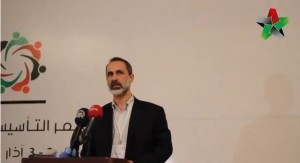Aleppo City and Province Councils Lack Women Representatives

*Lina al-Hakim
Editor’s Note: All names in this article have been changed or are pseudonyms to protect the individuals’ identities.
The local transitional governing bodies taking shape in areas controlled by the Syrian opposition have to fill the vacuum that resulted from the demise of the Syrian government’s institutions. The province of Aleppo, in particular, has been devastated by fighting since August of last year, and now lacks even the most basic services.

In March 2013, the opposition-led Syrian National Coalition (SNC), held elections in the Turkish city of Gaziantep to choose members for the city and provincial councils of Aleppo. It was understood that these two chambers would work over the next six months to provide basic services such as electricity and garbage collection in addition to coordinating with the SNC to lay the groundwork for a transitional government.
Several clips were uploaded to YouTube showing workers cleaning the streets in opposition-controlled neighbourhoods, suggesting the council is already working on the ground.
At the time, then-SNC head Moaz Khatib described the elections as “historic.” But not everyone was happy with the results. Since then, many have complained that candidates from certain areas of the Aleppo countryside dominate the provincial council; that armed third parties exerted pressure to influence the results; and that ethnic and religious minorities are not adequately represented on the council.
Many are also unhappy with the complete absence of women from both the city and provincial council. Suad, an activist and graduate of the University of Aleppo, was one of two women who campaigned for but did not win a council seat.
Suad blamed the absence of female representation in the elected councils on women’s failure to organize, although she also admitted there is an intentional campaign to marginalize them.
“We as women activists have to admit our mistake in not forming a women’s organization to follow through on our word,” she said. “No one will give us our rights if we don’t fight for them. There are alliances committed to excluding us, it’s true, but ultimately it is a political game and the most ‘talented’ [at this game] is the one who forms the strongest alliance.”
Despite this, Suad says this is one of the fairest elections she’s ever witnessed.
Mariam, one of the activists present at the election, accused the Local Coordination Committees, or LCCs, in Aleppo and its countryside of excluding women from candidacy for the two councils.
“The LCCs did not see the need to nominate revolutionary women to attend the conference…so only men were nominated,” said Maryam. “The Aleppo University LCC was asked to nominate two young men and a young woman, but…they refused to nominate a girl and so they ran two male student candidates.”
In response to the accusation, Saleem, a member of the Aleppo University LCC, said his group did not deliberately exclude female activists, insisting that the women who are active in the group all refused to run because they reside in the “occupied” territories still controlled by the government and the candidates had to campaign under their real names.
Hadi, a member of an LCC in a rural city in Aleppo province (the only LCC of the Aleppo countryside that responded to the questions from The Damascus Bureau), defended the LCC’s decision not to nominate any woman.
“We are now fighting a war and it would be difficult for women to move freely in order to carry out her duties and be effective,” said Hadi.
While opposition militias control most of the Aleppo countryside, clashes continue in the western Aleppo Province, and those areas bordering the city are still under the control of government forces. In the city itself, the government still holds the western neighbourhoods, while the opposition controls the eastern neighbourhoods, which are mainly the poor areas of the city. The two sides are still battling for control of the southern areas of Salah al-Din and Saif Al-Dawla. The ancient city is now a battleground between two armies, blasted by regular artillery when fighting is underway and, in areas the government has already last, bombarded from the air.
Kamal, a male candidate who lost his bid for a seat on the Aleppo city council, supports Hadi’s notion that a council member position is too dangerous for a woman.
“There is no point in having women on the local councils because they are unprepared for the political game, which is notoriously a dirty one,” he reasoned.
Salem, who won his bid to become a city councilman, also says that “women will not be able to do the work that needs to be carried out,” stressing at the same time that the exclusion of women is not based on “any prejudice towards them.”
Suad, the former candidate, does not appear deterred by the lack of female representation on the city and provincial councils. She is already busy preparing to help women campaign for seats in Aleppo’s upcoming local council elections in six months.
“Now, as women rebels, we have to work for the next round,” she said.
* Lina al-Hakim is the pseudonym for a journalist living in Syria
